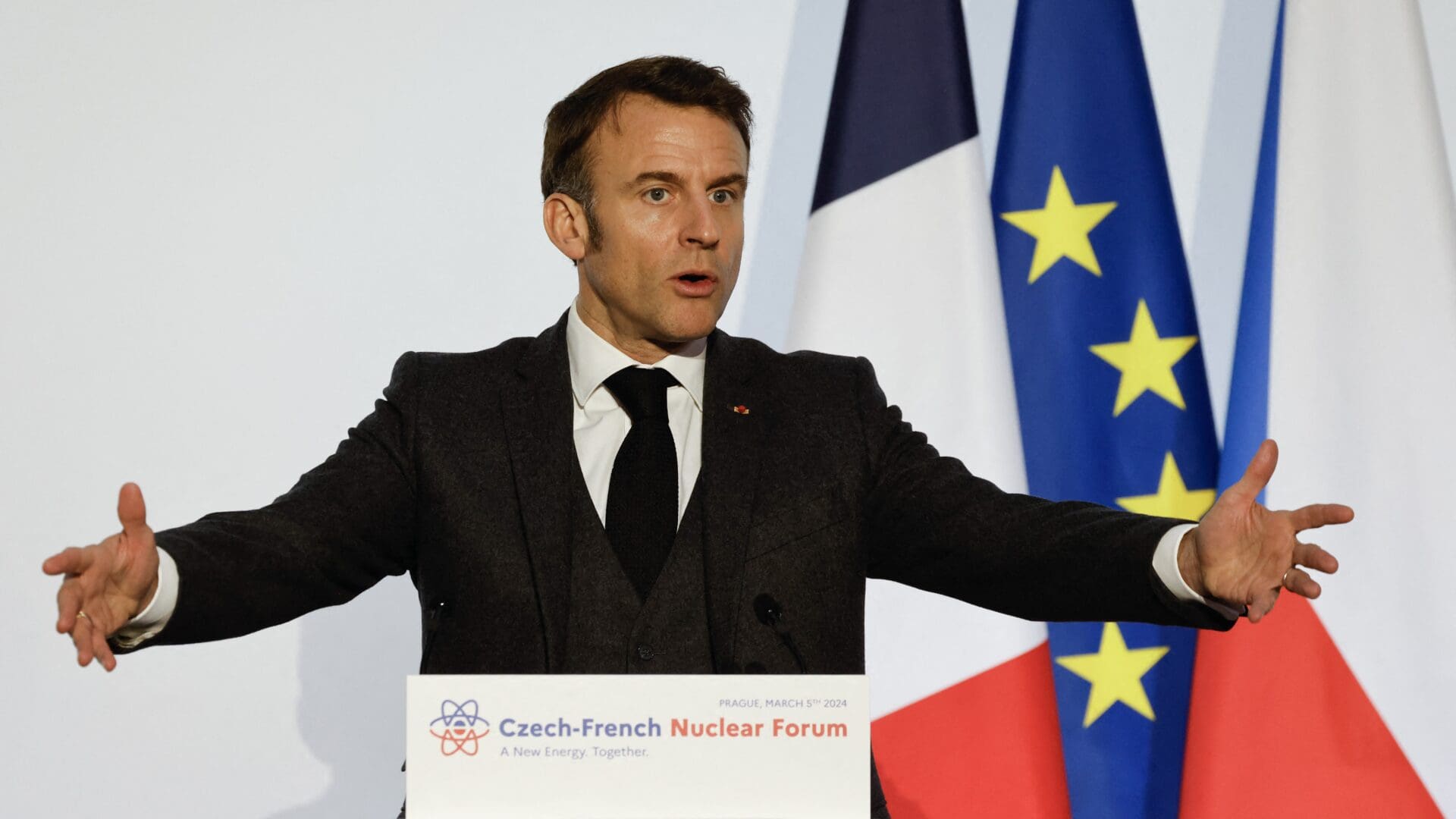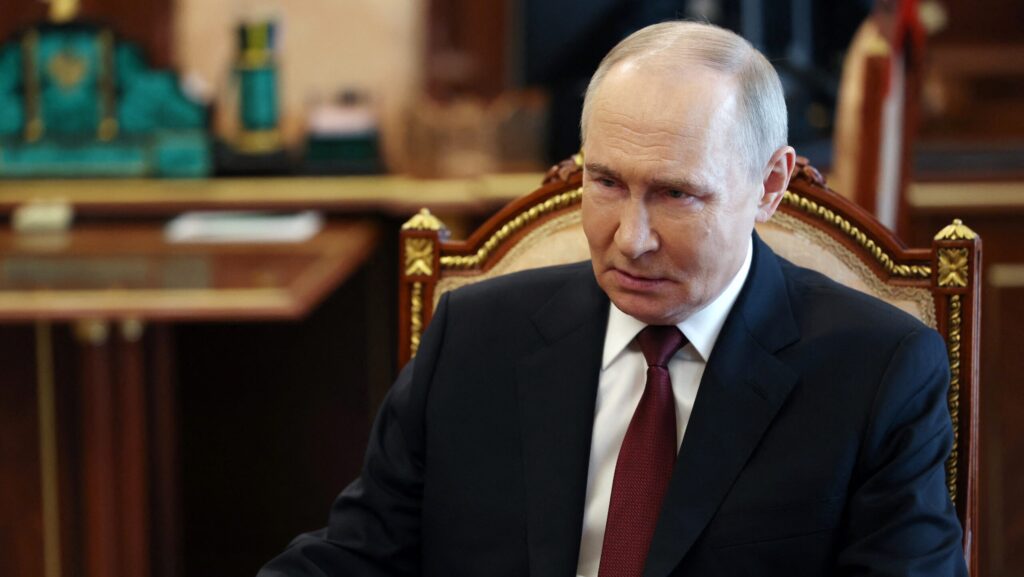Emmanuel Macron has changed tactics. The French president, who, following the outbreak of the war in Ukraine, engaged in a telephone conversation with Russian President Vladimir Putin and stressed the importance of maintaining channels of communication and dialogue, has transformed. In his place, we now see an Emmanuel Macron consumed by war fever, who, with a slight touch of exaggeration, would confront Moscow akin to Napoleon.
Early March, the French president stated that it was not beyond the realm of possibility for Western countries to deploy troops in Ukraine. Macron’s remarks sparked a huge outcry, prompting allies to distance themselves from him, with one or two more radical exceptions. One might have expected this reaction to lead the French president to retract his statement, but quite the contrary has happened: Macron has become driven by bloodlust.
While he mentioned in an interview before his visit to the Czech Republic on Tuesday last week that France had no immediate plans to send troops to Ukraine, following discussions with Czech Prime Minister Petr Fiala and Czech President Petr Pavel, he asserted that European allies must not act cowardly regarding supporting Kyiv. On Thursday, he informed French party leaders that backing Ukraine has ‘no red lines’ and ‘no limits,’ arguing that a ‘cautious’ approach would only grant Russia a significant advantage.
The conflict has barely entered its third year, and the risk of escalation is increasing daily.
In response to Macron’s statement, Vladimir Putin has issued threats of nuclear retaliation against Western countries that deploy troops to Ukraine. It’s worth noting that it’s widely known that some Western troops are currently present in the war-torn country, primarily engaged in training Ukrainian forces and maintaining and operating Western weaponry. According to various press reports, these Western troops have played a crucial role in restraining the Ukrainian army from targeting Russian targets that could significantly escalate the conflict. However, Macron was not talking about such troops, and that is a significant difference.
The French president’s aggressive stance, aside from escalating tensions, has strained relations among allies, fostering a growing divide between Berlin and Paris not witnessed since the outset of the conflict. German Defence Minister Boris Pistorius responded with some resentment to Macron’s remarks, suggesting that there was currently no need to discuss troop deployments or question bravery. According to POLITICO, longstanding tensions between France and Germany have been exacerbated by disagreements over support for Ukraine. Berlin particularly views unfavourably Macron’s portrayal of himself as a war leader, especially considering Paris’s lower level of military aid to Kyiv compared to Berlin’s contributions.
As previously advocated by Hungarian Conservative, Macron’s statements can indeed be viewed as a potential campaign starter for the European Parliament elections. This is especially relevant given the declining popularity of his party, La République En Marche (LREM), in France, and the same can be said about the EP’s Renew. However, recent research conducted by the Századvég Foundation indicates that voters across Europe are distancing themselves from the French president’s rhetoric. The study reveals that more than two-thirds (67 per cent) of EU and UK citizens are opposed to their respective countries deploying troops to Ukraine. Furthermore, the research highlights that in none of the countries surveyed is there a majority of respondents supportive of aiding Kyiv through troop deployment.
The situation is similar in France. A poll conducted last December revealed that only 20 per cent of French people support increasing military and strategic aid to Kyiv. 39 per cent believe that aid should be reduced or halted entirely, while 26 per cent support maintaining the current levels of assistance.
Making a Legacy
The allies have not been stirred up; the will of the electorate is completely at odds with the deployment of the troops. So what could have been Macron’s goal? There have been countless expert analyses of the issue, some taking a very blunt approach. One theory is that the French president is using reverse psychology and manipulation to persuade his Western allies to move in the direction of peace talks. This aim could indeed sanctify the means, but it is more than likely not the case.
It also cannot be ruled out that Macron may be strategically positioning himself as a strong and assertive leader in light of the potential re-election of former US President Donald Trump, given Trump’s penchant for tough negotiation partners. However, it is worth noting that the former president is known for his advocacy of peaceful resolutions, making it unlikely for him to align with a leader espousing overtly pro-war rhetoric. Such a scenario has the potential to further strain relations between Europe and the United States.
Many speculate that Macron’s remarks were aimed at exerting pressure on Russia. Undoubtedly, the deployment of Western troops in Ukraine would escalate the conflict to an unprecedented level, potentially posing a significant challenge for Moscow in terms of its response—assuming Vladimir Putin does not immediately press the red button. While this scenario remains plausible, the Ukrainian reaction, characterized by gratitude for the offer but an emphasis on the request for weapons rather than troops, suggests it may not be the most probable reason.
In 2017, Emmanuel Macron made history as the youngest president in modern French history, assuming office at the age of 39. A prominent figure in business and politics, he embarked on his first term with grand ambitions but ultimately fell short of many of his objectives. Now midway through his second term, with no possibility of re-election, Macron finds himself with nothing to lose. The true motivations behind his actions must be sought here.
Macron appears driven by a desire to leave a lasting legacy,
which was also evident in his determination to enact contentious reforms such as the overhaul of the French pension system. This pursuit of historical significance continues to shape his actions today.
Macron’s ambition appears to be to become the European leader who defeated Russia, or at least somehow solved the conflict in Ukraine. Initially, he pursued peace talks, diplomacy, and dialogue as the primary means to achieve this goal. However, in light of the lack of receptivity from Western allies, Macron is trying to do the complete opposite. Macron wants to lead Europe, but neither France nor other Western countries seem willing to let him.
It seems he overlooks the reality of the situation: the conflict in Ukraine has progressed far beyond a stage where
victory on the battlefield for either side remains feasible.
While the presence of Western troops might undoubtedly bolster Ukrainian forces, it would also precipitate the onset of a potentially catastrophic scenario—a third world war with a high probability of escalating into a nuclear conflict. And we know that there are no victors in a nuclear war.
If these are indeed Macron’s goals, we can expect that his recent statements are just the tip of the iceberg. However, it’s not just about warmongering or achieving a total victory over Russia that could define his legacy. With his influence and diplomatic skills, Macron possesses the potential to play a pivotal role in facilitating a peaceful resolution to the conflict. Collaborating with leaders such as Hungarian Prime Minister Viktor Orbán or the potentially re-elected Donald Trump, Macron could make great strides towards ending the war in Ukraine.
Macron could be an important piece in the puzzle for peace in Ukraine, perhaps one of the most important ones, along with German Chancellor Olaf Scholz. But he has chosen not to. Macron wants to go down in the history books, or so it seems, as a war leader, which could bring very dangerous times for Europe. One thing’s for sure: we’re now farther from peace than we were in the entire two years of war, and that’s incredibly concerning.
Related articles:








